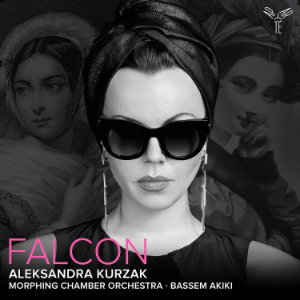
Aleksandra Kurzak (soprano)
Falcon
Morphing Chamber Orchestra/Bassem Akiki
rec. 2023, Lorely-Saal, Vienna
Aparté AP353 [67]
Polish soprano Aleksandra Kurzak is here, on her third album, celebrating the remarkable voice of the legendary nineteenth century, Parisian dramatic soprano Marie-Cornélie Falcon (1814-1897), who gave her name to the ‘Falcon’ soprano, a voice type renowned for its strong, dark lower register ability to soar aloft.
Falcon studied at the Paris Conservatory and her most notable teacher was the much-admired French operatic tenor Adolphe Nourrit. Aged just eighteen, her operatic debut was in 1832 at L’Opéra in Paris as Alice from Meyerbeer’s French Grand Opera Robert le diable, alongside Nourrit, the creator of the title role. She was soon given the honour of creating several more roles, two of which were tailor-made for her, notably Rachel in Halévy’s La Juive (Paris 1835) and Valentine in Meyerbeer’s Les Huguenots (Paris 1836). She had a very short yet spectacular career that sadly ended abruptly after just five years when, aged only twenty-three, she succumbed to serious vocal problems.
Soprano Aleksandra Kurzak began her opera career in 1996 with lyric and coloratura roles and over time her voice has become larger and stronger. In September 2024, she celebrated her hundredth performance at the New York Metropolitan Opera singing Tosca. This year is also the twentieth anniversary of Kurzak’s Met debut as Olympia in Offenbach’s Les contes d’Hoffmann. This November, she debuts as another eponymous heroine in Giordano’s Fedoraat the Grand Théâtre de Genève and I understand that she is considering the role of Aida.
For this Aparté album, Kurzak has devised a mouthwatering programme of ‘Falcon’ arias, mainly heavy roles that present a significant challenge which she meets head on. Spanning fifty years, with libretti in three different languages Italian, French and German, Kurzak’s collection consists of a work each from nine composers. The collection ranges from the classical period of Mozart (1756-1791) to the Romantic era with Berlioz (1803-1869). The oldest work is Donna Anna’s recitative and aria Crudele? Ah no, mio bene!… Non mi dir, bell’idol mio from Mozart’s Don Giovanni (1787 Prague) which Kurzak sings with convincing sincerity and emotion.
Another praiseworthy performance is the Countess Adele’s aria En proie à la tristesse from Rossini’s French bel cantomasterpiece, the comic opera Le Comte Ory (Count Ory) premiered in 1828. Kurzak relishes the witty libretto as the countess expresses her melancholy state of mind. Convincing and assured, Kurzak gives a full-blooded, virtuosa display of coloratura and the way she soars to her high notes is stunning.
Like Rossini, Halévy was a prolific opera composer, highly praised in his day. He is best known today for a single French grand opera La Juive (The Jewess) which was a triumph and served as a keystone of the Romantic repertoire for a century in France. Like most French Grand operas, it fell out of the repertory although a few such as Meyerbeer’s Robert le diable and Les Huguenots and La Juive, too, have begun once more to receive some stagings. Special praise is due to Kurzak’s performance of Rachel’s Act Two romance Il va venir (He is going to come!) one of best-known arias from La Juive. Adopted as a Jew, Rachel is terrified of the dire consequence if she is caught with Samuel who is really prince Léopold, a Christian. Displaying her rich and flexible tone, Kurzak is alert to the import of the text providing an admirable level of emotional intensity.
The most recent aria here is Léonor’s recitative and aria “Ah! Quel songe affreux!” from Louis Niedermeyer’s rarely heard French Grand Opera Stradella, premiered in 1837. It was during only the second performance of Stradella that Cornélie Falcon lost her voice and never recovered. Kurzak’s dramatic portrayal does not disappoint, though it is only to be expected that such powerful expression of emotion incurs some unevenness in her voice production.
Under conductor Bassem Akiki, the Morphing Chamber Orchestra gives Kurzak consistent support playing with style and plenty of expression. Recorded by Little Tribeca under studio conditions in the Lorely-Saal, Vienna, the sound is pleasing: full, clear and well-balanced. The CD booklet provides an essay ‘Cornélie Falcon, the shooting star of romantic opera’ by Patrick Barbier. The sung libretti are given, but unfortunately there are no English translations. Curiously, the booklet contains no pictures of Falcon.
I sincerely hope for further albums from Kurzak.
Michael Cookson
Buying this recording via a link below generates revenue for MWI, which helps the site remain free


Contents:
Wolfgang Amadeus Mozart (1756-1791)
1-2 Don Giovanni, K. 527. Opera in 2 acts with Italian libretto (premiere Prague, 1787)
Ludwig van Beethoven (1770-1827)
3-5 Ah Perfido! (Ah! Deceiver) dramatic scena in Italien, Op. 65 (premiere Leipzig 1796)
Gaspare Spontini (1774-1851)
6-7 La vestale (The Vestal Virgin), opera French libretto (premiere Paris 1807)
Jacques Fromental Halévy (1799-1862)
8 La Juive (The Jewess) French grand opera (premiere Paris 1835)
Giacomo Meyerbeer (1791-1864)
9 Les Huguenots, French grand opera in 5 acts (premiere Paris 1836)
Louis Niedermeyer (1802-1861)
10 Stradella, French grand opera in 5 acts (premiere Paris 1837)
Gioachino Rossini (1792-1868)
11 Le Comte Ory, comic opera in 2 acts. French libretto (premiere Paris 1828)
Hector Berlioz (1803-1869)
12 Mélodie. Le jeune pâtre breton (The Young Breton Shepherd), H 65
(1833, revised 1834 version for soprano)
Carl Maria von Weber (1786-1826)
13 ‘Der Freischütz’ Romantic German opera in 3 acts, J. 277 (premiere Berlin 1821)

















